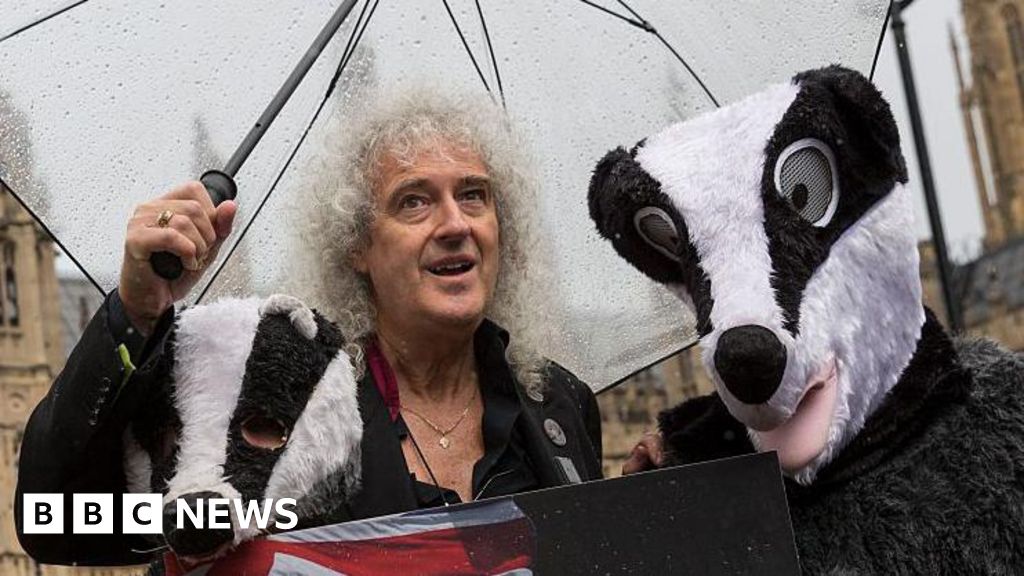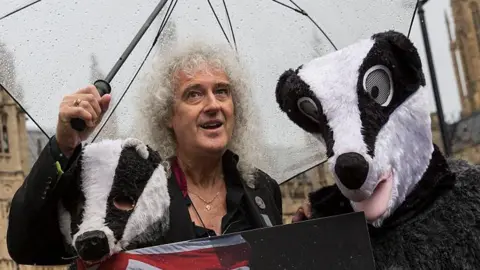 Getty Images
Getty ImagesQueen guitarist Sir Brian May believes that improving farm hygiene could help to provide a solution to the problem of bovine tuberculosis.
May, 77, has been campaigning against badger culling to tackle bTB for more than a decade, claiming the animal has been “brutally persecuted”.
Cattle are regularly tested and destroyed if the disease is found, with more than 50,000 slaughtered in the UK between April last year and March this year.
A leading vet said May’s findings could not be viewed in isolation, while a farmer who has lost 500 of his herd to the disease said badgers “do contribute” to the bTB problem.
A badger culling programme in England to combat bTB began 11 years ago. Widespread badger culling is not used in Wales, Scotland or Northern Ireland.
In England, it remains a controversial weapon in the important battle to keep cows free of a disease that puts both them and humans at risk.
By next year, it is likely to have resulted in the deaths of 250,000 badgers, costing the UK taxpayer more than £100m.
Labour pledged before last month’s general election to look at new ways to tackle bTB spread “so that we can end the ineffective badger cull”.
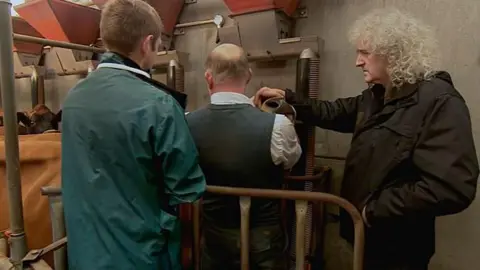 BBC | Athena Films | BBC Inside Out
BBC | Athena Films | BBC Inside OutIn a new personally authored BBC documentary, after commissioned research which took more than 10 years, May has questioned the idea that badgers are a significant factor in the spread of bTB, suggesting that cattle could be passing it between themselves.
“At the root of it all there are certain principles which need to be followed which are really keeping the pathogen from progressing throughout a herd, cutting off its line of transmission,” the musician and campaigner said.
After working with farms in Wales and England, May concluded that the pathogen which caused the spread of bTB was present in large quantities in the faeces of cattle which can contaminate food and water for the animals.
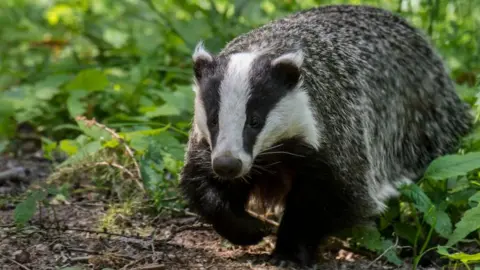 Getty Images
Getty Images“Everything is within the herd,” May claimed.
“The spread of bTB is from cow to cow and it’s because of inefficient hygiene situations. Biosecurity in the old days meant keeping the badgers out but now means keeping the slurry away from the cows so they can’t infect each other,” he added.
Wales’ former chief veterinary officer said that, while slurry management was important in tackling bTB, it was hard to achieve on some farms and should not be viewed in isolation.
“TB can arrive on a farm through an infected animal, through dirty boots being walked on to a farm, indeed the possibility of infected slurry being spread in the fields next door,” said Christianne Glossop, the new chairwoman of the Royal Veterinary College.
“It’s also possible that other infected species, including the badger, may introduce infection onto a farm.”
 Getty Images
Getty Images“I’d come in to save the badgers, I now realise that to save the badgers you have to save everybody,” May said in Brian May: The Badgers, the Farmers and Me, which airs on Friday.
Working with vet Dick Sibley at Gatcombe Farm in Devon, May’s research suggested that the standard bTB skin test did not detect all instances of the disease in cattle that could be captured with enhanced testing.
As a result, he said herds or bulls that were considered bTB free could in fact have been spreading the disease.
While analysing cattle faeces, the bTB pathogen M. Bovis was found.
The farm introduced a new hygiene regime, to keep the faeces from contaminating living areas, food and water.
After four years in 2019, the farm became officially bTB free.
“It’s been an incredibly fruitful journey for us. An amazing journey of discovery,” May said.
Ms Glossop, Wales’ top vet for 17 years before stepping down in 2022, paid “tribute” to May’s work.
“Brian has demonstrated on one really big TB breakdown in Devon that where the vet and farmer work together, improve biosecurity practices and in this case focusing particularly on faeces.
“But also by avoiding calves being infected by their mothers at birth, identifying high risk animals and keeping them separate, he has successfully demonstrated success in driving down levels of TB.
“Did that case study prove that badgers have no role to play in the bovine TB equation? No, I don’t agree with that conclusion.”
Farmer Chris Mossman features in the documentary and was introduced to May’s theories in December 2020.
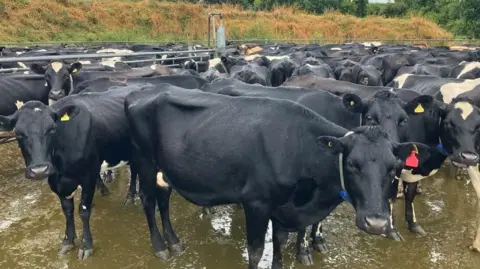
He has had more than 500 cows destroyed after testing positive for bTB at his farm in Llangrannog, Ceredigion, since 2016.
“It’s very interesting what Brian May and Dick Sibley have done but my opinion of TB is that it’s a very complex, complicated disease,” he said.
“It’s running rings around all of us because the situation is not improving. My way of thinking is, pursue it, let’s roll out onto other farms to see if they have an equal level of success with it, but we can’t put all our eggs in one basket.”
Mr Mossman said dealing with bTB in his herd had taken a toll on his mental health and following testing procedures and biosecurity measures required of him and his staff “imposed almost another job on top of our daily job just to cope with this disease”.
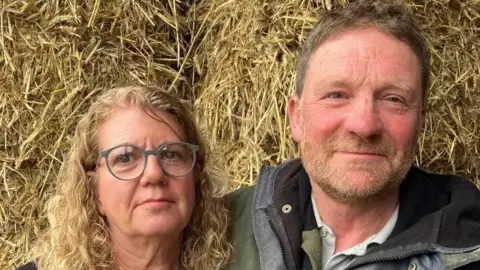
A trial badger cull was established in the 1990s to assess its effectiveness in controlling bTB.
Lord John Krebs, who was behind that 10-year scientific trial, told May’s programme: “If you really want to control TB in cattle then killing badgers is not going to be a terribly effective policy.”
In 2011, the UK government decided to cull badgers in TB hotspots in England because – after re-interpreting the Krebs evidence – it concluded badgers could be contributing to the spread of bovine TB.
Between April 2023 and March 2024, more than 21,000 cattle were slaughtered in England after bTB was found, with 11,197 animals killed in Wales and 18,577 in Northern Ireland.
Scotland is officially bTB free and incidence is very low.
The UK government said it was working towards a situation where badger culling could be ended in England.
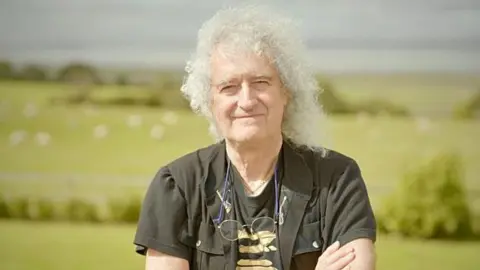 BBC | Athena Films | BBC Inside Out
BBC | Athena Films | BBC Inside Out“We recognise the devastating impact bovine TB has on the farming community which is why we are committed to beating this insidious disease,” said the Department for Environment, Food and Rural Affairs.
“This government will roll out a TB eradication package including vaccination, herd management and biosecurity measures to achieve our objective of getting to bovine TB free status and end the badger cull.”
Of the 11,000 cattle killed in Wales last year, nearly 40% were in Pembrokeshire.
Last week, the Welsh government established a board in an attempt to reach a TB-free Wales.
The Welsh government said it was “very aware of the distressing impact of bovine TB on the health and well-being of our farmers and their families and we are absolutely determined to eradicate this devastating disease”.
Some in the agricultural world are sceptical and May presented his ideas to an audience of farmers in Aberystwyth in 2023.
He said he knew he had a lot to do to win over some, but was determined to carry on.
“Generally we get a little bit of suspicion and hostility from the farming community when we start and I don’t blame them because why would we have anything to offer – rock star and wildlife campaigner,” he said.
“I didn’t come here for a fight, I think we can make a change and offer hope.
“We’ve been 12 years on this trail and we’ve made discoveries which no-one else has made.
“Speaking out against the culling of badgers has become as important to me as music.”
